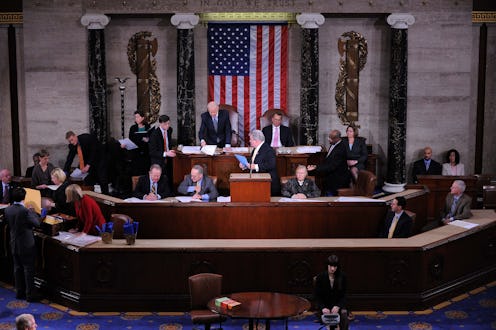News
The Electoral College Could Still Dump Trump
It's safe to say the protestors who on Sunday continued into their fifth straight day of protesting the election of Donald Trump did not vote for him. But it wasn't just Hillary Clinton supporters who were wary of a Trump presidency at the polls. Some 56 percent of voters said they were "concerned" or "scared" of a Trump presidency, according to exit polls. Much of the Republican establishment was also weary of his candidacy, and some like John McCain even pulled their support. So given the opposition can the Electoral College elect another Republican for President?
Yes, technically it could. The Electoral College is of course the group of 538 electors that actually decide the winner of our presidential elections. It is not the popular vote that does so (Hillary Clinton won that by as much as 2 million). The way it works is that each state has a number of votes equal to their congressional delegation, with D.C. getting three. Depending on which party wins a state, either the chosen Democratic or Republican electors vote on Dec. 19 for president and vice president. Then they send in their votes to Congress, where they are read in January, finalizing the whole process.
But there's really nothing stopping a "faithless elector" from casting a ballot for another candidate except for small state-level fines in 29 states. That's why a Change.org ballot has caught on asking the electors to vote for Clinton instead of Trump. Even the founding fathers had this in mind when they created the system (at least originally; the current version was arguably created to suppress black votes). Alexander Hamilton wrote in The Federalist Papers that the Constitution is designed so "that the office of President will never fall to the lot of any man who is not in an eminent degree endowed with the requisite qualifications," FactCheck.org reported.
In other words, this might be the moment to use the Electoral College for what it was originally designed. As the author of a Change.org petition, Elijah Berg, wrote, "Mr. Trump is unfit to serve. His scapegoating of so many Americans, and his impulsivity, bullying, lying, admitted history of sexual assault, and utter lack of experience make him a danger to the Republic." He is calling on the electors to vote for Clinton instead — but Republicans make up at least 290 of the electors (and a winner needs just 270).
They might therefore prefer to consider another Republican. At least 10 percent of Republicans didn't vote for him according to exit polls, and plenty more than that may have preferred a Jeb Bush, Marco Rubio, or John Kasich. Plus, you have to consider all those that opposed a Trump presidency but chose not to vote (after all only about 55 percent of the country cast a ballot). If the electors choose to take that into consideration it's completely possible Trump could lose, at least with a little bit of coordination in the electors.
That's because they'll need to decide which candidate to support. Whoever it is will need the 270 votes to win. This is in no doubt a tall order, but it is technically possible and would keep Donald Trump out of the White House.
